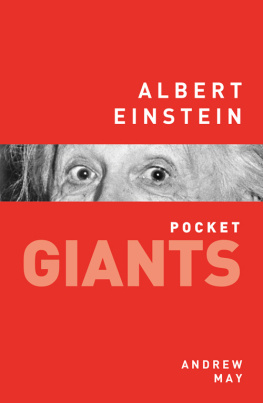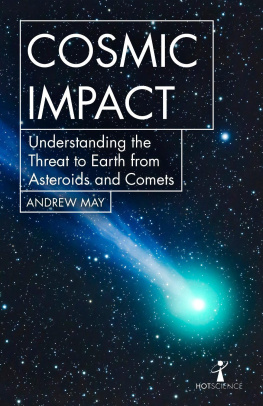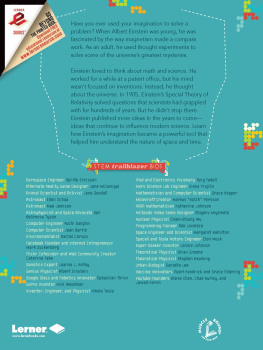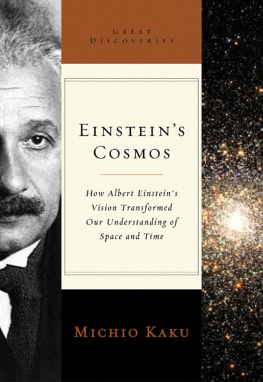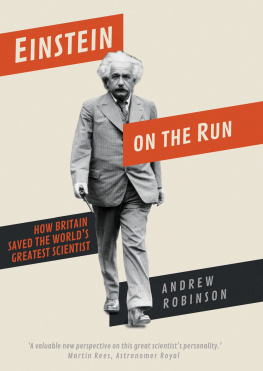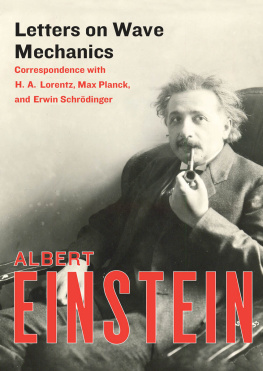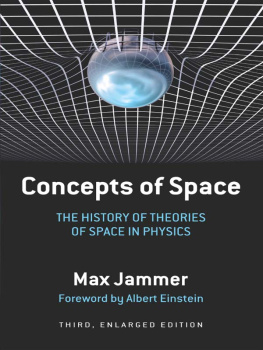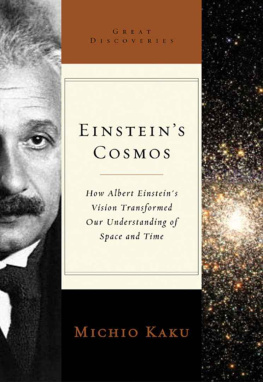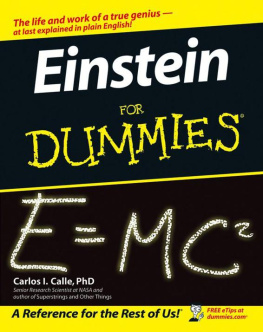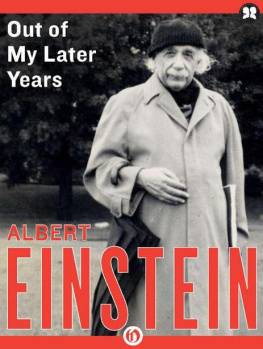Introduction
elementary laws from which the cosmos can be built up by pure deduction.
Einstein
Few people will be surprised to see Albert Einstein featuring in this series of pocket GIANTS : You dont have to be Einstein to work that one out. His name has become a byword for genius, even amongst those who have only the vaguest idea of who he was or what he did. He may have been the greatest scientist of the twentieth century: the point is debatable. What is beyond dispute, however, is that Einstein was the most famous scientist of that century and probably the most instantly recognisable scientist of all time.
What did Einstein do to gain his reputation as a great scientist? How and why did he become such an international celebrity? It might be imagined that the answer to the second question follows automatically from the first, but the truth is not so straightforward. The popular fascination with Einstein becomes harder, not easier, to understand in light of the highly abstract and specialised nature of his scientific work.
First and foremost, Albert Einstein was a thinker. As he himself said: What is essential for a man like me is what he thinks and how he thinks, not what he does or experiences. In Einsteins case the how was particularly important. He consciously employed a form of reasoning known as deduction, which was common in philosophy but disparaged by most scientists. The idea is to start with an initial proposition and carry it through to its logical conclusion. The strength of the approach lies in the fact that the outcome is necessarily true not just likely if the starting premise is true. Its weakness and the reason other scientists shied away from it is that a false premise will inevitably lead to a false conclusion. Einstein, however, was confident he could select a valid starting point through pure intuition:
The intuitive grasp of the essentials of a large complex of facts leads the scientist to the postulation of a hypothetical basic law or laws. From these laws, he derives his conclusions.
The supreme task of the physicist is to arrive at those universal elementary laws from which the cosmos can be built up by pure deduction. There is no logical path to these laws; only intuition.
Einsteins genius lay in his ability to start in the right place and think his way through to a logical conclusion no matter how counter-intuitive it might appear. The only experiments he conducted were thought experiments mental images of what and how things must happen if certain fundamental postulates were correct. Virtually all the work for which he is remembered used this approach. The result was not just a revolution in science but a series of revolutions. Almost single-handedly, Einstein transformed the way the world now thinks about light, matter, space and time.
One discovery more than any other is associated with Einstein: his theory of relativity. In spite of the name, this is not so much concerned with what is relative as with the invariants of nature things that are the same everywhere. There are really two distinct theories, special relativity and general relativity, which will be discussed in detail in Chapters 4 and 5.
Both theories started with a simple proposition, which Einstein took as self-evident. In the case of special relativity it was the idea that the laws of physics must be identical in any inertial frame of reference in other words, any co-ordinate system that is stationary or moving at a constant velocity. This was not a new idea, but Einstein was the first person bold enough, and clear-thinking enough, to follow the argument through to its logical conclusion. It all happened in a flash of insight in the spring of 1905, soon after his 26th birthday: I suddenly comprehended it Five weeks after my recognition of this, the present theory of special relativity was completed.
General relativity likewise started with a simple if somewhat less intuitive proposition: that a local frame of reference falling freely under gravity behaves exactly as if it were an inertial frame (for a full explanation of what this means, see Chapter 5). This idea, which Einstein later referred to as the luckiest thought of his life, occurred to him in 1907. To work out all of its consequences took not five weeks, as with special relativity, but eight years. At the end of that time, Einstein had created his own theory of gravity, usurping that of Newton which had held sway for more than two centuries.
Einsteins theories of relativity are remarkable achievements, both for the extent to which they redefined our basic notions of space and time, and for the unconventional approach he used in formulating them. According to Otto Frisch, one of the outstanding physicists of the following generation, the basic concept of relativity would probably never have occurred to anyone else at the time:
Nothing but the extraordinary power and concentration of Einstein would have been enough. The clue that led to special relativity was one of the great breakthroughs comparable with the achievements of Galileo and Newton something that only happens once in a few hundred years.
The same is true of general relativity. As the American physicist Kip Thorne put it: Without Einstein, the general relativistic laws of gravity might not have been discovered until several decades later.
It is easy to understand why Einstein is held in such high regard by scientists. The work he did was of fundamental importance, and he succeeded in solving problems that left his peers baffled. But why should that make him a household name? Why is Einstein the one scientist everyone has heard of? The answer is a complex mixture of factors: partly his personality and physical appearance, partly his activities and pronouncements on non-scientific matters, partly the fact of his being in the right place at the right time.
Einsteins fame has very little to do with the specific details of his scientific work. When he first came to public attention, in the 1920s, an understanding of his theories was not seen as a prerequisite for talking about them. Just the opposite in fact their very obscurity was part of their appeal. Journalists gleefully reported that no more than a dozen people in the world were capable of understanding Einsteins theory of general relativity.
Far from being an obstacle, the sheer incomprehensibility of Einsteins work was entirely in tune with the spirit of the 1920s. Relativity, with its disturbingly counter-intuitive consequences, was seen as part of the emerging avant-garde movement, on a par with atonal music and surrealist art. The abstract painter Piet Mondrian described his underlying principle as force is geometry
Einstein was, in his own way, just as much a rebel against convention as the artists of the avant-garde. He traced his rebellious streak to a particular phase of his childhood, when he had become disillusioned with the teachings of the Bible:
Through the reading of popular scientific books I soon reached the conviction that much in the stories of the Bible could not be true. The consequence was a positively fanatic freethinking coupled with the impression that youth is intentionally being deceived by the state through lies: it was a crushing impression. Suspicion against every kind of authority grew out of this experience.
In his personal appearance, too, Einstein was more reminiscent of a Bohemian artist than a professional scientist. His long, unruly hair and crumpled clothes made him stand out from the dapper, smartly dressed crowd of the interwar years. As Einsteins biographer Walter Isaacson put it: His baggy, comfortable clothes became a symbol of his lack of pretence He was able to make his rumpled-genius image as famous as Chaplin did the little tramp.

